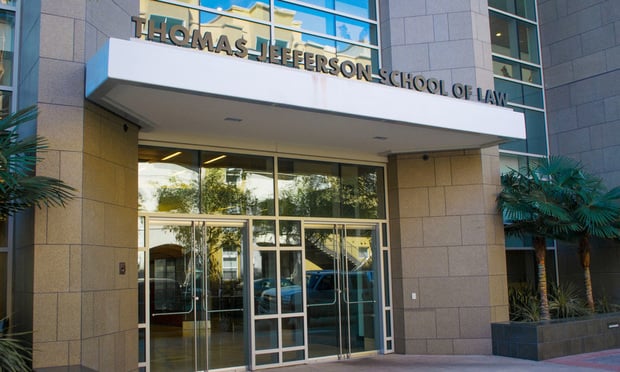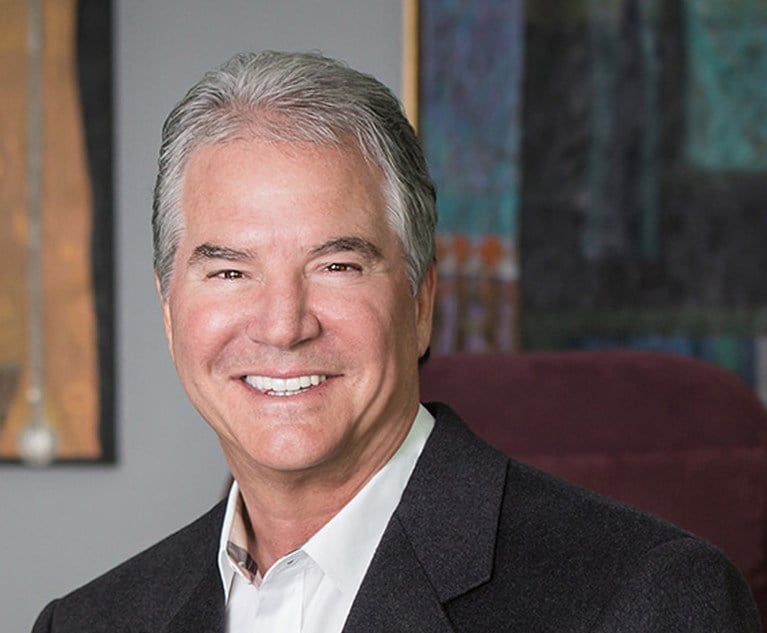Stripped of ABA Accreditation, Thomas Jefferson Law School Plans to Stay Open
The ranks of American Bar Association-accredited law schools in California are shrinking, with San Diego's Thomas Jefferson School of Law becoming to latest to fall off the list.
November 22, 2019 at 12:51 PM
5 minute read
 The former building of Thomas Jefferson School of Law, which the school vacated in 2018 to offload debt.
The former building of Thomas Jefferson School of Law, which the school vacated in 2018 to offload debt.
The Golden State has lost two American Bar Association-accredited law schools within the span of a week.
Thomas Jefferson School of Law will no longer have the ABA's seal of approval as of Dec. 17—the day after the fall semester ends. The announcement about the San Diego law school from the ABA's Section of Legal Education and Admission to the Bar follows a decision Nov. 18 by the trustees at the University of La Verne to convert its law school to one accredited by the State Bar of California and drop its ABA-accredited status.
Like La Verne, administrators at Thomas Jefferson said Friday that the school will remain in operation as a California-accredited campus, thus avoiding the fate of Arizona Summit Law School in Phoenix, which closed in 2018 shortly after losing its ABA accreditation. Program requirements for California accreditation are easier to meet than the ABA's accreditation standards, but the change means graduates of both schools won't be able to sit for the bar exam outside of California, at least initially.
"Although the law school will no longer admit students into the Juris Doctor program as an ABA-approved school, the law school will continue its 50-year tradition of educating successful and diverse lawyers who serve as leaders in the community and in access to justice," reads a statement issued by the law school.
The revocation of Thomas Jefferson's ABA accreditation was not unexpected. The ABA's legal education council in May voted to withdraw accreditation from the stand-alone law school for failing to comply with its admissions, governance and academic program standards. But the law school appealed that decision and remained accredited during the appeals process. Thomas Jefferson secured accreditation from the State Bar of California in advance the ABA's revocation and has also applied for accreditation from the Western Association of Schools and Colleges.
"The law school is disappointed by the appeals panel's decision, and is focused on ensuring that its current students will graduate pursuant to an ABA-approved teach-out plan here at Thomas Jefferson School of Law," the statement reads.
Struggling law schools in California have more options than campuses in other states. The state bar maintains its own accreditation process that allows graduates of those schools to take the bar exam, which is unique among jurisdictions. (Graduates of California-accredited law schools may take the bar in 19 other jurisdictions, but only after first passing the California test, then meeting other requirements such as a number of years in practice.) In June, interim Thomas Jefferson law Dean Linda Keller acknowledged that becoming California accredited would likely hurt enrollment at the school, which has already seen the size of its classes shrink dramatically over the last eight years. Thomas Jefferson enrolled 1,066 students in 2011, which had dwindled to 326 in 2018—a decline of more than 69%, ABA records show.
With the departures of Thomas Jefferson and La Verne, the roles of ABA-accredited law schools in California will drop to 18. Whittier Law School in Costa Mesa is in its final year of operation after university officials decided to close it down amid declining enrollment and financial challenges. Meanwhile, the number of California-accredited law schools will soon increase to 23 with the two new additions.
Graduates of California-accredited law schools largely struggle to pass the bar exam. Just 26% of first-time bar takers from those schools passed the July 2019 California bar exam, while that figure was 71% for graduates of ABA-accredited law schools.
Thomas Jefferson must now submit a teach-out plan to the ABA, which details how all current students will complete their degrees, according to a Nov. 21 notice announcing the decision. The school noted that other campuses that have lost ABA-accreditation have been allowed to confer degrees to current students. Thomas Jefferson plans to move ahead with its spring semester, and next fall will admit new students as a California-accredited law school.
The past decade has been an extremely difficult one for the once-prospering San Diego school. It was riding high in the late 2000s when officials decided to build a new, state-of-the-art campus downtown for which the school borrowed heavily to finance. That $90 million campus opened in 2011, the year after Thomas Jefferson hit its peak enrollment and the start of the seven-year decline in national law school enrollment. The law school struggled to meet its debt obligations in the ensuing years.
In a bid to rein in costs, the school vacated its seven-year-old campus in 2018 and relocated into a 24-story downtown San Diego office building—a move the school said would erase its massive debt load. Administrators also said they were increasing the academic credentials of incoming students and investing more heavily in bar preparation, but those measures appear not to have swayed the ABA.
"The law school looks forward to continuing its rich tradition of educating strong classes of diverse attorneys and providing much-needed service to the community," the school's statement reads.
This content has been archived. It is available through our partners, LexisNexis® and Bloomberg Law.
To view this content, please continue to their sites.
Not a Lexis Subscriber?
Subscribe Now
Not a Bloomberg Law Subscriber?
Subscribe Now
NOT FOR REPRINT
© 2025 ALM Global, LLC, All Rights Reserved. Request academic re-use from www.copyright.com. All other uses, submit a request to [email protected]. For more information visit Asset & Logo Licensing.
You Might Like
View All
Assessing the Second Trump Presidency’s Impact on College Sports


LSAT Administrator Sues to Block AI Tutor From Using ‘Famous, Distinctive’ Test Prep Materials
3 minute readTrending Stories
- 1Pogo Stick Maker Wants Financing Company to Pay $20M After Bailing Out Client
- 2Goldman Sachs Secures Dismissal of Celebrity Manager's Lawsuit Over Failed Deal
- 3Trump Moves to Withdraw Applications to Halt Now-Completed Sentencing
- 4Trump's RTO Mandate May Have Some Gov't Lawyers Polishing Their Resumes
- 5A Judge Is Raising Questions About Docket Rotation
Who Got The Work
J. Brugh Lower of Gibbons has entered an appearance for industrial equipment supplier Devco Corporation in a pending trademark infringement lawsuit. The suit, accusing the defendant of selling knock-off Graco products, was filed Dec. 18 in New Jersey District Court by Rivkin Radler on behalf of Graco Inc. and Graco Minnesota. The case, assigned to U.S. District Judge Zahid N. Quraishi, is 3:24-cv-11294, Graco Inc. et al v. Devco Corporation.
Who Got The Work
Rebecca Maller-Stein and Kent A. Yalowitz of Arnold & Porter Kaye Scholer have entered their appearances for Hanaco Venture Capital and its executives, Lior Prosor and David Frankel, in a pending securities lawsuit. The action, filed on Dec. 24 in New York Southern District Court by Zell, Aron & Co. on behalf of Goldeneye Advisors, accuses the defendants of negligently and fraudulently managing the plaintiff's $1 million investment. The case, assigned to U.S. District Judge Vernon S. Broderick, is 1:24-cv-09918, Goldeneye Advisors, LLC v. Hanaco Venture Capital, Ltd. et al.
Who Got The Work
Attorneys from A&O Shearman has stepped in as defense counsel for Toronto-Dominion Bank and other defendants in a pending securities class action. The suit, filed Dec. 11 in New York Southern District Court by Bleichmar Fonti & Auld, accuses the defendants of concealing the bank's 'pervasive' deficiencies in regards to its compliance with the Bank Secrecy Act and the quality of its anti-money laundering controls. The case, assigned to U.S. District Judge Arun Subramanian, is 1:24-cv-09445, Gonzalez v. The Toronto-Dominion Bank et al.
Who Got The Work
Crown Castle International, a Pennsylvania company providing shared communications infrastructure, has turned to Luke D. Wolf of Gordon Rees Scully Mansukhani to fend off a pending breach-of-contract lawsuit. The court action, filed Nov. 25 in Michigan Eastern District Court by Hooper Hathaway PC on behalf of The Town Residences LLC, accuses Crown Castle of failing to transfer approximately $30,000 in utility payments from T-Mobile in breach of a roof-top lease and assignment agreement. The case, assigned to U.S. District Judge Susan K. Declercq, is 2:24-cv-13131, The Town Residences LLC v. T-Mobile US, Inc. et al.
Who Got The Work
Wilfred P. Coronato and Daniel M. Schwartz of McCarter & English have stepped in as defense counsel to Electrolux Home Products Inc. in a pending product liability lawsuit. The court action, filed Nov. 26 in New York Eastern District Court by Poulos Lopiccolo PC and Nagel Rice LLP on behalf of David Stern, alleges that the defendant's refrigerators’ drawers and shelving repeatedly break and fall apart within months after purchase. The case, assigned to U.S. District Judge Joan M. Azrack, is 2:24-cv-08204, Stern v. Electrolux Home Products, Inc.
Featured Firms
Law Offices of Gary Martin Hays & Associates, P.C.
(470) 294-1674
Law Offices of Mark E. Salomone
(857) 444-6468
Smith & Hassler
(713) 739-1250







